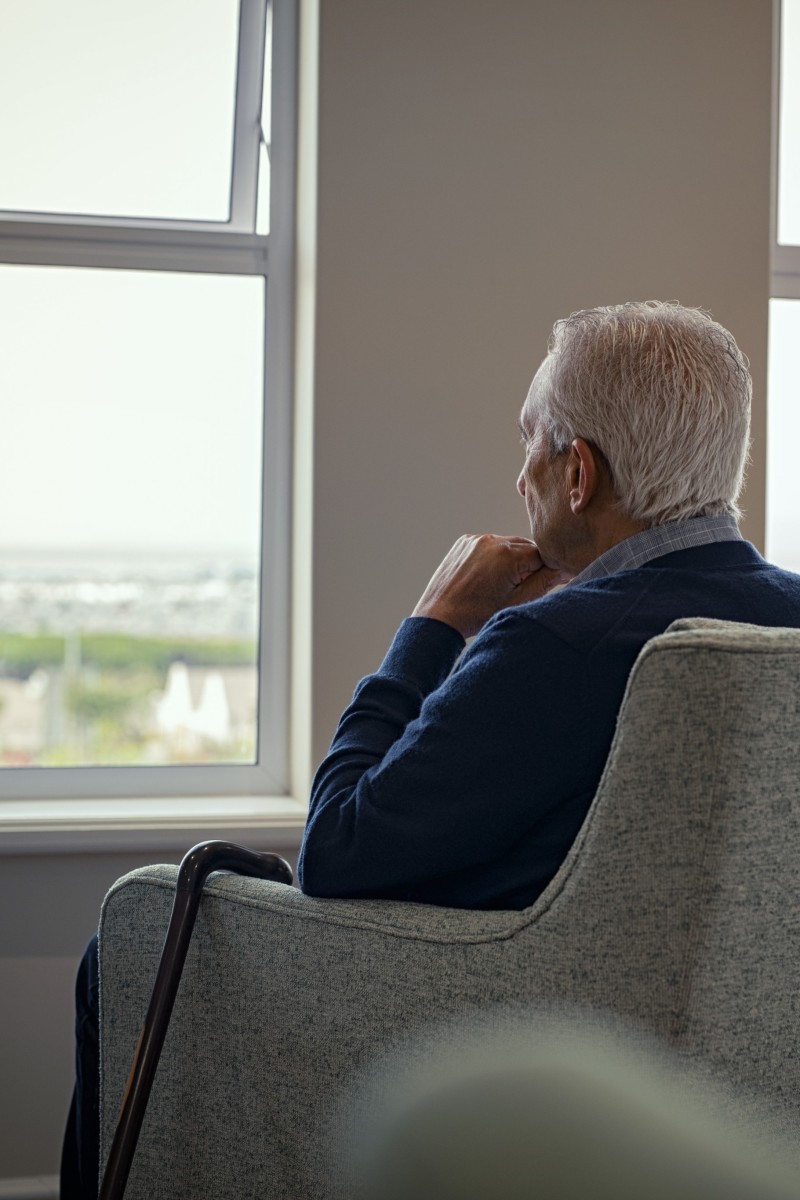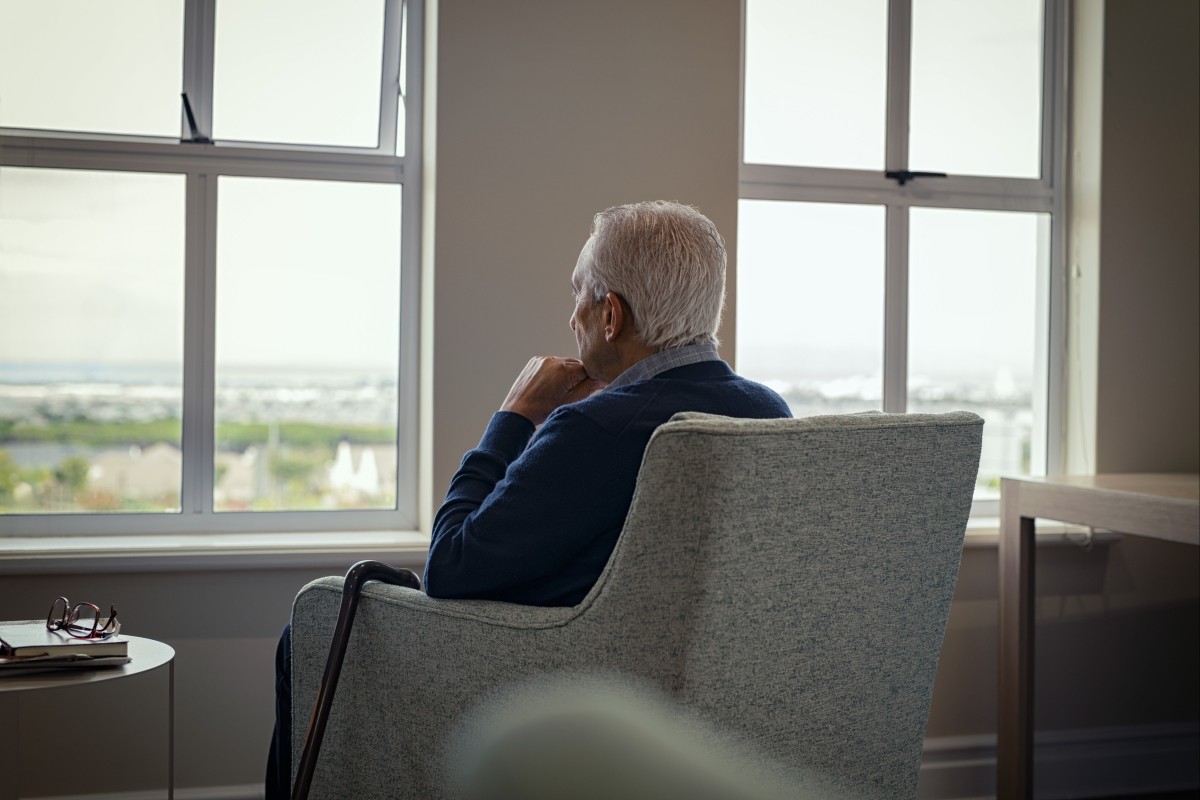
Talking about depression with older loved ones can be hard; here’s how to start
- Covid-19 has led to an increase in mental health issues, even in elderly adults, who may be less likely to seek help due to stigma
- If you’ve noticed changes in your relative or family friend, you can start a conversation with them and offer to accompany them to the doctor
 The coronavirus pandemic has had a mental toll on nearly everyone, especially the elderly. Photo: Shutterstock
The coronavirus pandemic has had a mental toll on nearly everyone, especially the elderly. Photo: ShutterstockThe arrival of Covid-19 has brought about a rise in mental health concerns, and older adults haven’t been exempt from the mental toll of the pandemic, which has left them with increased rates of depression.
The stigma surrounding mental illness has contributed to the perception that depression is a normal part of ageing and makes it harder for older adults to seek professional help, said Marcia Ory, a regents and distinguished professor at the Texas A&M School of Public Health in the US.
“Depression is common in old age, but ageing is not in itself a factor in who’s going to be depressed or not,” Ory said.
Help! Everyone is so stressed about the pandemic. How can I help them?
Estimates put the rate of depression among older adults at or below 5 per cent, according to the Centres for Disease Control and Prevention (CDC) in the US. That rate, however, rises among older adults who are hospitalised – 11.5 per cent – or need home healthcare – 13.5 per cent.
Older adults are at a higher risk of depression, in part, due to the relationship between mental illness and other conditions: the CDC estimates about 80 per cent of older adults deal with at least one chronic health condition.
Factors like other medical conditions, loneliness and social isolation, lack of physical activity, sleep problems and functional limitations can be related to depression, but do not necessarily cause depression, according to the National Institute on Ageing.
“When there’s a new onset of depression for older adults, it’s brought on by the many changes that they’re going through as they get older,” said Kathleen Cameron, Senior Director of the National Council on Ageing’s Centre for Healthy Ageing.
Growing number of young people in China speak out about battle with social phobia
Common signs of depression
Common symptoms of depression include feelings of sadness or anxiety that last for weeks at a time, according to the CDC.
Some other signs are changes in appetite or sleep, irritability, fatigue, feelings of hopelessness, and loss of interest in once pleasurable activities.
“Depression often manifests itself differently in older people, where they don’t say they’re sad and blue, but they lose interest in activities or they don’t sleep as well or they’re not eating as well,” Ory said. “The symptomatology is unique for every single person.”
Suicidal thoughts may be symptoms of depression. Adults ages 75 and up account for fewer than 10 per cent of all suicides, but have the highest rate, according to the CDC. Older men have the highest suicide rate compared to other groups.
“Older men tend to be more stoic and have kind of succumb to the stigma associated with mental health and don’t seek help,” Cameron said.
Older adults who recognise signs of depression that last for more than two or three weeks should consult their primary care doctor to rule out whether the symptoms may be caused by other factors, such as medication or medical conditions, said María P Aranda, a professor of social work and gerontology at the University of Southern California in the US.
In cases of suicidal ideation, it’s important to seek help as soon as possible, Ory said.
“You want to get them help right away; usually the first thing would be calling a suicide hotline and then making an appointment with their healthcare provider,” Ory said.
I feel so alone, even when I’m surrounded by people – what should I do?
What family and friends can do
Family members can sometimes pick up on whether a person’s mood has changed over time.
“They’re not clinicians, so they can’t treat depression, particularly the more serious and long lasting depression, but they can offer support,” Ory said.
If an older loved one is showing signs of depression, here’s what you can do:
Hong Kong psychologist uses Instagram to teach about handling tough feelings
– Start the conversation. Show empathy and concern about the changes you have noticed in them. Ory recommended avoiding the word “depressed” outright and instead talking about the signs they have noted. Aranda suggested family and friends communicate they want to be supportive and “they’re in their corner.”
– Help set up a medical appointment and accompany them. Family members and friends can encourage loved ones to seek medical treatment. “But it’s not just saying, ‘Oh, I think you should talk to your doctor,’” Ory said. “(It’s) ‘Let me make an appointment and go with you.’”
– Participate in activities the person enjoys, such as “going out with their grandchildren or getting together with friends,” Cameron said. “Better understanding what the older person wants to achieve in life will help find some solutions and help the person get back to doing those things that they truly enjoy.”
– Keep in mind that it might take more than one try for them to open up. “It might take multiple times to have that conversation,” Cameron said. “You don’t want to alienate the person by pushing too much, but don’t give up. Keep going back, but do it in a gentle manner.”